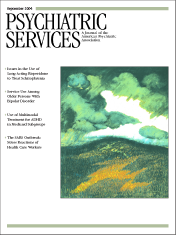Practical Application of Pharmacotherapy With Long-Acting Risperidone for Patients With Schizophrenia
Abstract
OBJECTIVE: It is now generally accepted that the use of second-generation, or atypical, antipsychotics for schizophrenia represents an advance over conventional antipsychotic agents. However, adherence continues to be a problem, as with other medications for chronic disorders. Long-acting formulations of conventional antipsychotics partly address adherence problems, but their use is limited by tolerability issues. This article provides practical advice to physicians on the characteristics of patients who would benefit from treatment with long-acting atypical antipsychotic agents and offers suggestions on how to initiate treatment. METHODS: A literature search for studies published between 1980 and 2003 that evaluated the treatment of patients with schizophrenia with long-acting atypical agents was conducted by using MEDLINE and EMBASE. The primary search parameters were "schizophrenia," "atypical," "antipsychotic," and "long-acting." As expected, long-acting risperidone was the only long-acting atypical agent identified; thus this article focuses on practical advice and suggestions on how to initiate therapy with long-acting risperidone. RESULTS AND DISCUSSION: From the results of the literature search and the discussion of a panel of experts at a meeting held in Dublin in 2003 and supported by Johnson & Johnson, it is possible to conclude that long-acting risperidone has demonstrated efficacy and tolerability, even among patients who are considered clinically stable on other antipsychotics. Most patients can switch safely and effectively to long-acting risperidone if appropriate strategies are applied. Long-acting risperidone provides a new and promising therapeutic option for the treatment of schizophrenia.



